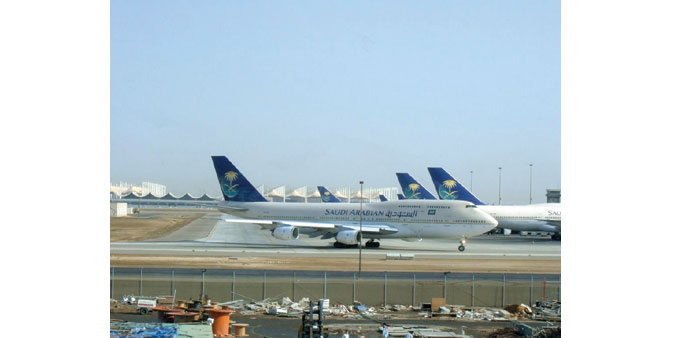Jeddah airport, the country’s busiest, is already on the block as the government seeks $1bn from investors tied to a 20-year management deal
Slump in oil price prompts search for outside investment; Dammam, Abha airports also in running for concession deals
Bloomberg
London
Saudi Arabia is preparing more airports for privatisation as the lower price of crude pushes the No 1 oil exporter to seek outside funding for infrastructure work.
Saudi hubs that have functioned as extensions of the state will be put on a more businesslike footing as a prelude to seeking external investment through long-term concessions to run them, Michael Burns of PricewaterhouseCoopers, which is advising the government on the process, said in an interview.
With Jeddah airport, the country’s busiest, already on the block as the government seeks $1bn from investors tied to a 20-year management deal, second-ranked Riyadh, which serves the capital, and Dammam are next in line.
“With a lot of their airport infrastructure built in the 1990s they are looking to refresh and rebuild their terminals,” Burns said. “The government is looking to share some of that risk.” European airport operators and contractors are likely to lead the bidding, backed by pension funds, he said.
The International Monetary Fund has forecast a first Saudi current-account deficit in more than a decade after crude, which accounts for 90% of revenue, more than halved in price in 12 months. Reserves at the central bank have tumbled 10% from a year ago, or by more than $70bn. Saudi Arabia is playing catch-up in seeking to modernise its airports after Qatar and the UAE made aviation the focus of efforts to reduce dependency on oil and gas. Dubai has expanded its hub into one of the world’s busiest with 70.5mn passengers in 2014, and is building a new base set to have a capacity of 120mn by the mid-2020s.
Saudi Arabia has been focused on handling the annual influx of millions of haj pilgrims bound for Makkah, served by airports at Jeddah, which attracted 28mn passengers in 2014, and Ta’if, where an upgrade tender has also been issued.
Riyadh handled 20mn passengers in 2014, according to official data, while 8.3mn used third-ranked Dammam.
Of the other top Saudi terminals, Medinah, which also gets haj visitors, is already benefiting from a 25-year concession awarded to a group led by Turkey’s TAV Havalimanlari Holding AS in exchange for $1.2bn of funds. That leaves Abha in the southeast, with 2.7mn, as the other prime prospect.
Neighbouring Jordan set the pace in Mideast privatisations, awarding a 25-year construction and management deal in Amman to Airport International Group, led by Aeroports de Paris, in 2007. Aqaba on the Red Sea may undergo a similar process.
The move toward outsourcing construction and management of airports could extend to Oman, Bahrain and even the UAE as the crash in oil prices and wars in Syria and Yemen pressure local finances, Burns said. A similar privatisation process may follow in Iraq and North Africa if security risks are resolved.

